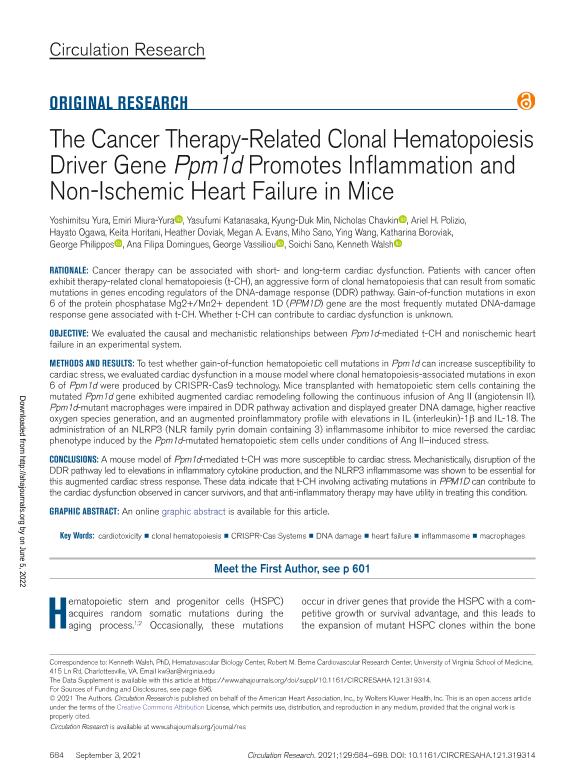Artículo
The Cancer Therapy-Related Clonal Hematopoiesis Driver Gene Ppm1d Promotes Inflammation and Non-Ischemic Heart Failure in Mice
Yoshimitsu, Yura; Miura Yura, Emiri; Yasufumi, Katanasaka; Kyung Duk, Min; Chavkin, Nicholas; Polizio, Ariel Héctor ; Ogawa, Hayato; Horitani, Keita; Doviak, Heather; Evans, Megan A.; Sano, Miho; Wang, Ying; Boroviak, Katharina; Philippos, George; Domingues, Ana Filipa; Vassiliou, George; Sano, Soichi; Walsh, Kenneth
; Ogawa, Hayato; Horitani, Keita; Doviak, Heather; Evans, Megan A.; Sano, Miho; Wang, Ying; Boroviak, Katharina; Philippos, George; Domingues, Ana Filipa; Vassiliou, George; Sano, Soichi; Walsh, Kenneth
 ; Ogawa, Hayato; Horitani, Keita; Doviak, Heather; Evans, Megan A.; Sano, Miho; Wang, Ying; Boroviak, Katharina; Philippos, George; Domingues, Ana Filipa; Vassiliou, George; Sano, Soichi; Walsh, Kenneth
; Ogawa, Hayato; Horitani, Keita; Doviak, Heather; Evans, Megan A.; Sano, Miho; Wang, Ying; Boroviak, Katharina; Philippos, George; Domingues, Ana Filipa; Vassiliou, George; Sano, Soichi; Walsh, Kenneth
Fecha de publicación:
09/2021
Editorial:
Lippincott Williams
Revista:
Circulation Research
ISSN:
0009-7330
Idioma:
Inglés
Tipo de recurso:
Artículo publicado
Clasificación temática:
Resumen
Rationale: Cancer therapy can be associated with short- and long-term cardiac dysfunction. Patients with cancer often exhibit therapy-related clonal hematopoiesis (t-CH), an aggressive form of clonal hematopoiesis that can result from somatic mutations in genes encoding regulators of the DNA-damage response (DDR) pathway. Gain-of-function mutations in exon 6 of the protein phosphatase Mg2+/Mn2+ dependent 1D (PPM1D) gene are the most frequently mutated DNA-damage response gene associated with t-CH. Whether t-CH can contribute to cardiac dysfunction is unknown. Objective: We evaluated the causal and mechanistic relationships between Ppm1d-mediated t-CH and nonischemic heart failure in an experimental system. Methods and Results: To test whether gain-of-function hematopoietic cell mutations in Ppm1d can increase susceptibility to cardiac stress, we evaluated cardiac dysfunction in a mouse model where clonal hematopoiesis-associated mutations in exon 6 of Ppm1d were produced by CRISPR-Cas9 technology. Mice transplanted with hematopoietic stem cells containing the mutated Ppm1d gene exhibited augmented cardiac remodeling following the continuous infusion of Ang II (angiotensin II). Ppm1d-mutant macrophages were impaired in DDR pathway activation and displayed greater DNA damage, higher reactive oxygen species generation, and an augmented proinflammatory profile with elevations in IL (interleukin)-1β and IL-18. The administration of an NLRP3 (NLR family pyrin domain containing 3) inflammasome inhibitor to mice reversed the cardiac phenotype induced by the Ppm1d-mutated hematopoietic stem cells under conditions of Ang II-induced stress. Conclusions: A mouse model of Ppm1d-mediated t-CH was more susceptible to cardiac stress. Mechanistically, disruption of the DDR pathway led to elevations in inflammatory cytokine production, and the NLRP3 inflammasome was shown to be essential for this augmented cardiac stress response. These data indicate that t-CH involving activating mutations in PPM1D can contribute to the cardiac dysfunction observed in cancer survivors, and that anti-inflammatory therapy may have utility in treating this condition.
Archivos asociados
Licencia
Identificadores
Colecciones
Articulos(OCA HOUSSAY)
Articulos de OFICINA DE COORDINACION ADMINISTRATIVA HOUSSAY
Articulos de OFICINA DE COORDINACION ADMINISTRATIVA HOUSSAY
Citación
Yoshimitsu, Yura; Miura Yura, Emiri; Yasufumi, Katanasaka; Kyung Duk, Min; Chavkin, Nicholas; et al.; The Cancer Therapy-Related Clonal Hematopoiesis Driver Gene Ppm1d Promotes Inflammation and Non-Ischemic Heart Failure in Mice; Lippincott Williams; Circulation Research; 129; 6; 9-2021; 684-698
Compartir
Altmétricas



